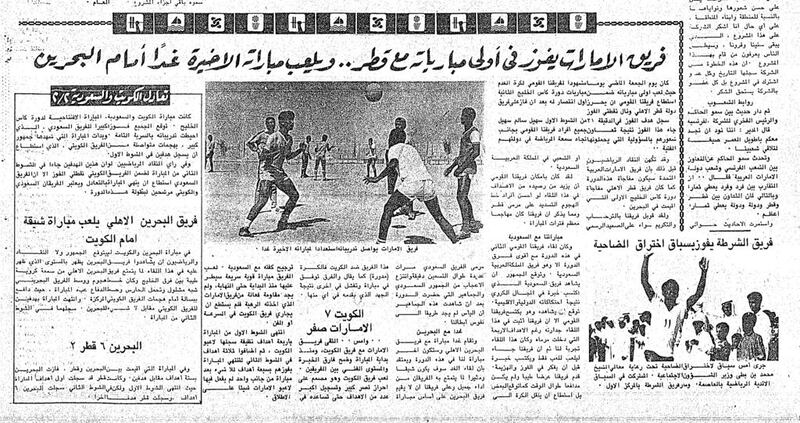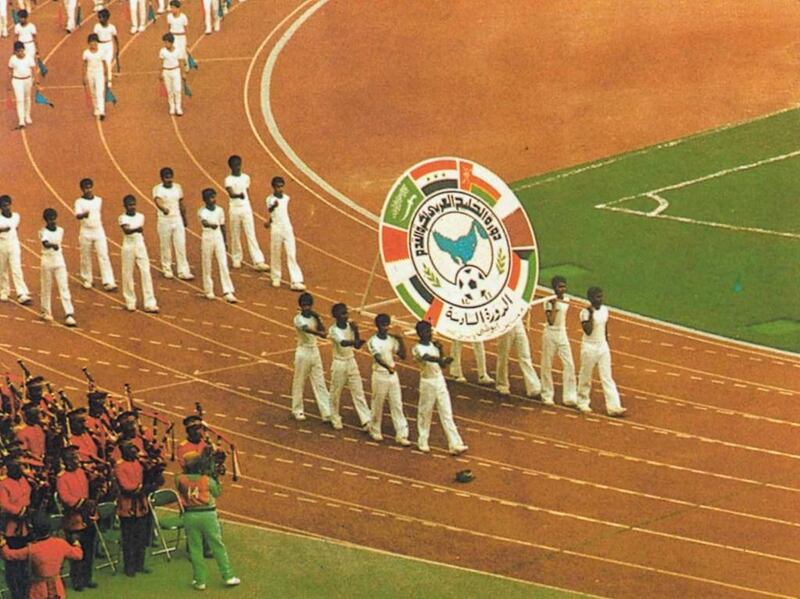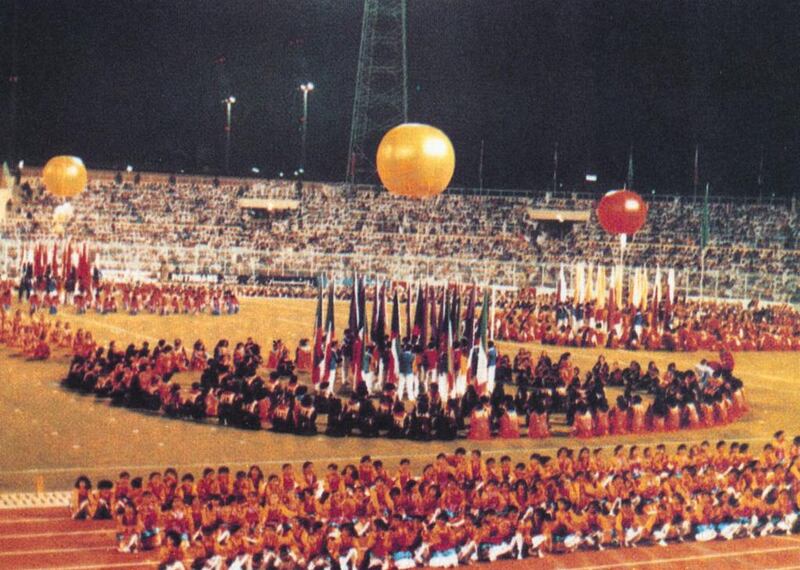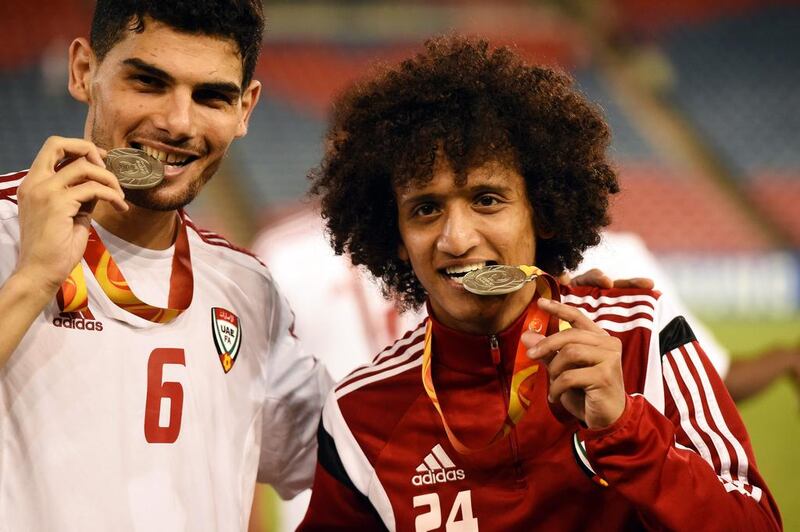Friday, March 17, 1972.
Less than four months after the UAE had come into existence, a group of young men were among the first to write themselves into the sporting history of the new nation.
That day, on a sandy pitch at Prince Faisal bin Fahd Stadium in Malaz, Saudi Arabia, the UAE played its first international football match, facing Qatar in the second edition of the Gulf Cup of Nations.
There were no friendly matches and scarcely any time to prepare a group of players who, until that point, represented clubs scattered across the seven independent emirates.
Few details have survived from the match. What is known is that on 22 minutes, Salem Suhail of Al Nasr opened the scoring to give the UAE a 1-0 lead.
See more: Memory Lane – A look at the UAE's sporting milestones
Qatar, who went on to lose all their matches and finish bottom of the table, could not find an equaliser in the second half, and the UAE’s introduction to international football got off to a winning start.
What did survive the sparsely witnessed occasion is the legacy of a cast of characters now considered the pioneers of Emirati football.
The coach, Egyptian Mohammed Sheita. The Nasr triumvirate of Suhail, Rajab Abdulrahman and Salem Bushnain. Above all there was Al Ahli’s Ahmad Eissa, the first man to lead the UAE on to a football pitch for an international.
In an interview with Emirati journalist and football historian Mohammed Aljoker for the Arabic-language newspaper Al Bayan five years ago, Eissa recalled that landmark day.
“I remember it was such an important happening to take part in the Gulf Cup for the first time in March 1972,” Eissa said.
“We managed to win against Qatar thanks to a goal by the dangerous Salem Suhail.
“During the tournament, Bahrain’s results were nullified which allowed us to finish third and make the podium.
“We were ecstatic to see the UAE flag proudly flying.”
After beating Qatar, the UAE’s results dipped. They lost 4-0 to Saudi Arabia 48 hours later, and 7-0 to holders and eventual champions Kuwait on March 22.
Only the withdrawal of Bahrain, who had beaten UAE 2-0 in their final match, handed the Emiratis third place. That did not lessen the achievement in Eissa’s eyes. “It was a huge achievement for us,” he said.
“To finish third in our first participation, and only four months after the union, was not only a fine achievement for us as players but also a source of pride for a whole generation and for everyone who was supporting the sporting movement back then.”
Eissa had been part of Al Wahda in Dubai (not to be confused with the current Abu Dhabi club of the same name) since 1969 and was instrumental in helping the club merge with Al Shabab (also unrelated to their current namesake) to form the modern-day Al Ahli club.
Sheita, then Ahli’s coach, was chosen to oversee the UAE’s first international, and his first act was making Eissa the UAE captain. Eissa remembers the coach’s impact on football in the Emirates.
“His arrival saw a rise in the standards of players, especially as he was adept at infusing both skills and discipline at the same time,” he said.
“At Al Wahda, we needed more of guardian than a coach, and I was one of the lucky ones who was mentored by this great coach who left his fingerprints over all our lives to this day. He was also one of Egypt’s greatest players during the country’s golden age and an outstanding player for his club, Al Ismaily.”
Against Qatar, and throughout the second Gulf Cup, the duo broke ground for Emirati football.
A photo of Eissa standing on an Olympic-style podium survives from the competition’s final day, with champions Kuwait and second-place Saudi occupying the top two positions.
Against Qatar, Suhail went down in history as the UAE’s first scorer.
The Nasr forward received a glowing report from Aljoker. “Suhail scored the first ever UAE international goal, and he was one of the greatest players to come out of the country, indeed the whole Gulf,” Aljoker said.
“He was exceptional at a time when resources were scarce and the media was not what it is now.
“He was fast and skillful and could deliver a great shot. In short, he had all the attributes any top footballer could need.”
At club level, Suhail developed a special understanding with Bushnain, perhaps the first superstar of Emirati football.
Bushnain became a fixture in the national team and an integral part of the Nasr team that won back-to-back UAE league championships in 1978 and 1979, the first two in the club’s history.
Bushnain was the team’s creative heart, and he famously disappeared from public life after retirement in 1980.
Years later, in a rare interview with Al Ittihad, the Arabic-language sister newspaper of The National, he spoke of what the game meant to him.
“In truth, I found in football everything I could need,” Bushnain said.
“Fame, the love of the fans and excelling (on the pitch) all satisfied my desires. The 70s was a golden age for Al Nasr, particularly between 1977 and 1979 when we won the title twice.”
Suhail and Bushnain were joined in the squad by another Nasr stalwart who took a more arduous route to the national team.
Abdulrahman’s journey began in Zanzibar, where he grew up kicking a football on the neighbourhood streets and beaches.
At 10 years old, he moved with his family to Egypt, where he took up the game seriously while attending secondary school.
After several years taking part in local school leagues, he was awarded a scholarship to study trade at a university in Syria.
In Damascus, Abdulrahman’s skills led him to join Barada Football Club and then Al Shorta for two seasons.
In 1970, he played a match that would change his life: a friendly for Shorta against Al Orouba, the club that eventually would become Sharjah.
He caught the eye of Nasr officials who happened to be attending a training camp in Syria at the same time.
Less than two months later, at the age of 20, he joined the UAE’s oldest football club. Finally in Dubai, Abdulrahman found a home and, like Suhail and Bushnain, was called up for the first UAE squad.
His journey reached a zenith that day in Malaz when he gained the honour of being one of the first 11 players to wear the UAE shirt.
Abdulrahman retired in 1982, and later in the decade he coached Al Nasr for four seasons.
But, like Bushnain, he disappeared from the public eye after leaving the club.
He says his memories of the early days of international football have faded with time, though it seems unlikely that dedicated fans of Emirati football have forgotten his contribution to the game.
What he does recall clearly is the uniqueness of the UAE’s debut on the international scene so soon after the creation of the union.
“Our situation was different to what it would be in the 1980s and 1990s,” he told Abu Dhabi Media’s Super.ae in 2008.
“It should be remembered that the UAE became the first team to take part in the Gulf Cup before it even had a domestic league.
“I played for the UAE Military team and the full national team, with that game against Qatar being my first match. And I took part in the second, third, fourth and fifth Gulf Cups as well.”
Abdulrahman, Bushnain, Suhail, Eissa and others from the first squad returned for the third Gulf Cup in 1974.
The UAE, however, finished fourth after losing the semi-final 6-0 to hosts Kuwait, who were fast becoming their bogey team.
Things would not improve for the UAE for a while. They were sixth in Qatar 1976 and Iraq 1979, the latter including a 7-0 loss to Kuwait.
The seeds of international success were not sown until the first Gulf Cup on home soil, in 1982. By then, none of the players who started against Qatar 10 years earlier were active for the national team.
The UAE’s first golden generation reached a milestone in qualifying for the 1990 World Cup, and what is being hailed as its second now hopes to emulate that achievement at Russia 2018.
It was the efforts of the pioneering players of 1972, however, that paved the way for everything that came in their wake.
akhaled@thenational.ae
Follow us on Twitter @NatSportUAE








